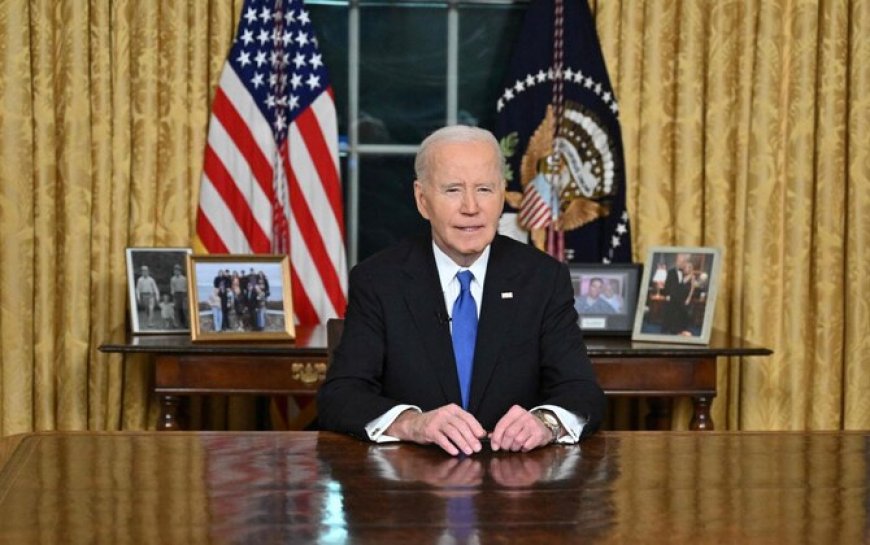"The Soul of America at Stake: Biden's Farewell Address and the Looming Threat of Trump’s Return"
As President Joe Biden delivers his farewell address to the nation, he once again raises the stakes of the 2025 election, warning that the “soul of America” remains at risk with Donald Trump poised to return to power. Biden's departure from office is set against the backdrop of an America still divided over its future, with the specter of Trump’s influence looming large over the political landscape. This stark warning about the soul of the nation calls attention to the deepening polarization that has marked the final years of Biden’s presidency and sets the stage for a critical moment in U.S. history.

As President Joe Biden delivers his farewell address to the nation, he once again raises the stakes of the 2025 election, warning that the “soul of America” remains at risk with Donald Trump poised to return to power. Biden's departure from office is set against the backdrop of an America still divided over its future, with the specter of Trump’s influence looming large over the political landscape. This stark warning about the soul of the nation calls attention to the deepening polarization that has marked the final years of Biden’s presidency and sets the stage for a critical moment in U.S. history.
Biden’s farewell address, delivered from the Oval Office on January 15, 2025, encapsulated his view that the very essence of the United States is under threat. In a letter previewing his speech, Biden stated, "I ran for president because I believed that the soul of America was at stake. The very nature of who we are was at stake. And, that’s still the case." He underscored that, despite significant strides made under his leadership, the future of America is still very much in the hands of the people. While he refrained from naming Trump directly, Biden’s rhetoric was unmistakably directed at the former president and his supporters. This framing was consistent with his past warnings that Trump posed an existential threat to American democracy, echoing his 2020 campaign messaging that centered around the idea that the country’s democratic institutions were under siege.
Biden’s presidency, which began amid one of the most tumultuous periods in modern American history, has often been defined by attempts to restore stability. When Biden took office in January 2021, the United States was still reeling from the January 6th Capitol riot, a direct result of Trump’s baseless claims of a stolen election. Biden referenced this moment in his address, saying that the U.S. had emerged stronger from what he described as “the worst attack on our democracy since the Civil War.” The period following Trump’s first term, marked by the COVID-19 pandemic and economic downturn, demanded decisive leadership—something Biden sought to provide through large-scale stimulus packages and public health measures. His administration also focused heavily on issues like climate change and healthcare reform, though these efforts have been met with mixed results.
Despite his achievements, including overseeing one of the world’s most robust economic recoveries post-pandemic, Biden has faced significant challenges. One such challenge has been his declining approval ratings, fueled in part by persistent inflation and rising costs of living. Public dissatisfaction with the state of the economy was a major factor in the Democratic Party’s electoral setbacks, leading many to question whether Biden, at 82, should seek a second term. The issue of Biden’s age became more pronounced following his poor performance in a June 2024 debate against Trump. The debate, marked by awkward exchanges and a lack of energy, ultimately led to Biden’s withdrawal from the 2024 race. His exit from the race was a blow to his supporters and to the Democratic Party, which had hoped for a more vigorous challenge to Trump in the 2024 election.
Biden’s decision to leave the race also highlighted tensions within the Democratic Party. In a farewell interview with The Washington Post, First Lady Jill Biden expressed disappointment with how the situation unfolded, suggesting that the party’s internal pressure on Biden to step aside left her frustrated. This sentiment is emblematic of the broader struggle within the Democratic Party, as many party leaders and activists were divided over whether Biden was still the best candidate to represent their values and counter Trump’s resurgence.
While Biden’s administration celebrated successes, such as the ceasefire agreement between Israel and Hamas, his legacy will be remembered as a mixed one. On the one hand, Biden can point to tangible accomplishments in areas like climate change, healthcare, and the economy. On the other hand, his presidency was plagued by controversies surrounding his handling of the withdrawal from Afghanistan and his ongoing struggle to unify a deeply divided nation. Biden’s final days in office are tinged with a sense of both accomplishment and regret, as he grapples with the reality that the country he sought to heal may once again be on the verge of a political crisis.
As the 2025 election approaches, the United States finds itself at a critical juncture. The battle for the "soul of America" is not just about political parties but about what kind of nation America wants to be moving forward. Will the country continue to embrace its democratic ideals, or will it succumb to the forces of division and authoritarianism that Trump has come to symbolize? With Trump’s return to prominence and Biden’s political departure, the next chapter in American history will be written by those who continue to believe in the promise of democracy—and those who seek to undermine it.
In the end, Biden’s farewell address underscores a deep truth: the soul of America, its identity and its future, is very much in play. As the nation looks ahead to the next election, the question remains whether the ideals of democracy, freedom, and equality will continue to define America—or whether they will be eclipsed by a darker, more divisive vision of the nation’s future.













































